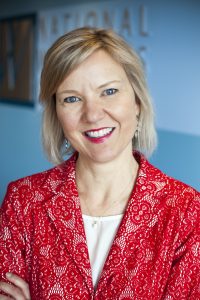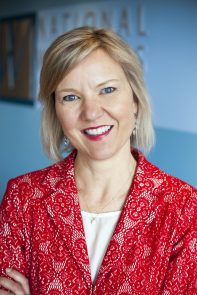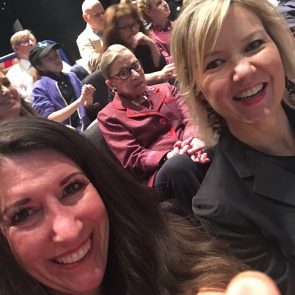“This Is Going to Be Trouble”: A Conversation with Mary-Frances Wain, Senior Vice President for External Affairs

 Mary-Frances Wain joined NWLC at the beginning of this month, taking on the new position of Senior Vice President for External Affairs. In this role, she will guide the work of the organization’s Communications and Development teams, and represent NWLC to the world beyond our walls. Mary-Frances brings 25 years of experience in the non-profit sector, most recently as Executive Director of Philanthropy at the United Nations Foundation. To kick off her tenure at NWLC, I joined her for a conversation about philanthropy, humor, and the art of the surreptitious selfie.
Mary-Frances Wain joined NWLC at the beginning of this month, taking on the new position of Senior Vice President for External Affairs. In this role, she will guide the work of the organization’s Communications and Development teams, and represent NWLC to the world beyond our walls. Mary-Frances brings 25 years of experience in the non-profit sector, most recently as Executive Director of Philanthropy at the United Nations Foundation. To kick off her tenure at NWLC, I joined her for a conversation about philanthropy, humor, and the art of the surreptitious selfie.
Welcome! First off, how did you get started in the nonprofit sector?
I started in nonprofit by accident about 25 years ago. I was an advertising major in college and thought that I would have a brilliant advertising career in New York, and ended up in D.C., working for an advertising trade association.
My job was to run a national student advertising competition on 200 college campuses all across the country. I would get an annual sponsor who would give the students a real-life case study, and they had to pitch like they were advertising teams to the client. It was great fun, a great first job. What we realized was that there were precious few students of color who were participating. But when we looked deeper, we realized that there were precious few students of color pursuing careers in advertising. So we started a foundation at the organization to encourage–in any number of ways, including scholarships–students of color who were pursuing degrees in advertising.
That’s when a lightbulb occurred, and I thought, “Wow, this is really cool.” I always thought, for as long as I can remember, that I would do something that would help change the world. I thought advertising was a way to do that, and I still fall back on those skills. But it had never occurred to me that I could actually have a career in the nonprofit sector. I’ve pretty much been in it ever since and loved it.
Is there a particular area of our work or a programmatic theme that resonates with your own experience or values?
It’s always been really important to me to give a voice to people who don’t have one. The most marginalized populations are those who live in poverty. I think the greatest crime you can commit is to be born poor in this country, and in the world. Often it’s women, too, who have caught my attention. And so I focus a lot on those issues, and often the intersection of those issues.
If I trace it back to my personal experience, it’s probably my father. My parents very much lived lives where everyone was treated equally, but my father, as a teacher and a coach, really recognized that not everybody is born to equal circumstances. He focused his teaching, his coaching, and his life on reaching out to those who weren’t at the table and giving them the opportunity to be there. That’s just how I grew up, and I didn’t know any different. That’s how I live my life, that’s how I raise my son, that’s how I decide where to invest my own money and my own time. That’s what’s really compelling to me.
When I first learned about this position, I said to my family, “This is my playbook. This is everything I care about under one roof.” My husband was like, “Oh, man. This is going to be trouble.” In a good way.
We are trying to focus our work on low-income women and women of color, and those who face multiple forms of discrimination. How, in your opinion, can we work to make sure that we’re continuing to center those individuals in our work?
I think it’s broadening our bench of champions and voices. For me, it’s not about me. It never has been, and it never will be. I want to make sure that I’m helping shine the spotlight on somebody that’s changing the world.
That, I think, is our charge and our mission. To enable people and give them opportunities to tell their stories and use their voices. That’s how we demonstrate the substance and the breadth of our work and our legacy. The more we can broaden the range of faces who are telling our story–certainly Fatima’s an important brand ambassador to have out front, and there are times that only Fatima can speak for the organization. But there are lots of other opportunities, too. There are voices across the staff, across our stakeholders, and across the broader community that can really demonstrate our impact and our unique role in the world.
Since you’re heading up both communications and development work, what do you see as some of the main areas where they overlap?
They’re two sides of the same coin. They’re inextricable. We ring-fence them at our own peril, because people don’t approach us in silos.
At the end of the day, from a development perspective, you’re trying to touch the imagination and the heart of an individual person. Whether they’re writing a check from their personal checkbook, their foundation checkbook, their corporate foundation checkbook, their corporate sponsorship checkbook–”checkbook” is a dated term at this point, but whatever purse they’re carrying–it’s about effectively communicating to an audience so that our work touches them and moves them.
You can’t be impactful as a development officer if you’re not a good communicator, and you can’t be a good communicator if you don’t know what you’re communicating about and for what. All of those pieces are interrelated, which is why I’m so excited by the opportunity to fill this chair.
These days, we’re working in an environment where there’s a lot of hostile legislation running counter to our goals. It could be really easy to become stuck in a defensive position. What do you think that we can do, as communicators and development professionals and as an organization, to make sure that we’re not just defending our goals but also advancing them?
We have to do both. We can’t let up on the pedal, but you’re right–we can’t do everything. It requires discipline and focus, and knowing which fights are ours and which fights are our colleagues’. That’s why consistent and clear communication about the vision for the center moving forward is so vital. It informs everything we do and every decision we make, and how we prioritize our work.
So a clear articulation of who we are and what the difference is that we want to make in the world, our unique value proposition, helps us decide what is in our lane and what actually we need others–other champions other community members–to pick up with our support. The most impactful thing we can do is to keep telling the stories, because negative isn’t compelling.
We need to say, “We’ve defended this and fought for this for 45 years, we own and carry that proud legacy forward, and we’re not giving up.” I think of the women who are carrying the signs that say “I can’t believe I’m still marching.” I love them for still marching, and there’s positivity in that. But an overwhelming defense posture and negativity doesn’t capture people’s imagination. That’s where positive stories of hope and change really help to inspire movements. So I think that’s our role too, making sure there’s time to inspire and to tell the wins, big and little. Because they’re all big.
Has there been a particular moment in your career that brings you the greatest pride?
I’m hopeful that I’m not near done, but I’ve had an amazing career and amazing opportunities. Frankly, my proudest moment was when I was running an organization called Suited for Change, which was focused on helping low-income women enter and reenter the workforce. Many of those women, when they got jobs, would then give money to support the organization and help other women. These are women who have nothing, who have gone through every horrible thing that you can imagine–things that should never ever happen to anyone. And they faced the day with a smile and determination, and they were donating.
There is great power in donating. People always say, “how do you ask for money?” Well, it’s matchmaking. It’s empowering. People can also advocate for change using their voice, but our time and treasure are some of the most precious gifts we can give to something that we care about. To see women being empowered by being a donor, and bringing others with them, is something I carry every single day. In fact, no matter the size of the organization, I often think: Would a donor be proud of how I’m spending their money? And I think of those women, who had $5 or $20 to spend, and they gave it to an organization they trusted would take care of other women like them.
We’re an organization with a lot of law nerds. We have a law nerd focus. But we’re also trying to branch out, to really become part of culture change. How do you think we can leverage our expertise to deepen that connection?
To truly achieve lasting change, law, policy, and the culture have to work together. That’s going to require us to make new friends and find new champions, to have other voices tell our stories. That, I think, is the really exciting part.
I see that very much as my job, to take the very substantive, wonky work of our incredible team of experts and to communicate it to everyday people so that they can see themselves in it, and feel like they own and are excited about it. My son at his middle school is now talking about dress code. That’s a great example of culture and policy and law working together to create change.
Our work requires a lot of tenacity and unflagging positivity. What are your self-care rituals?
I talked about my dad earlier, but my mother taught me from a very young age that you need to laugh. And she’s right. First of all, laugh at yourself, because somebody else is going to do it. Don’t take anything too seriously. Of course, our work here is big and needs to be taken seriously, but I think laughter helps us. There’s any number of reasons why laughter is a stress reliever and allows us to bond with others. I try to always approach life with a sense of humor, and I think that gets me to a healthy place.
I also run. I like running alone, without music. Sometimes I let my husband or son come along, but they have to be ten paces behind me so I can pretend I’m by myself. Running is very meditative to me.
I try to truly live a balanced life, and I encourage all my staff to do that as well. Balance on a daily basis is an impossible pursuit, but over the course of a month or a year it’s not. But you have to be really deliberate about it. There are times when I take my laptop home with me every single night for a while, because that’s just what the work demands. Then there are other times where I need to go on vacation and unplug, and I know the world will still spin if I do.
It’s important to force ourselves and each other to have balance in our lives. The more productive, happy, and well-rounded we are, the better we work.
 Is there a public figure that you would absolutely fail to keep your cool around?
Is there a public figure that you would absolutely fail to keep your cool around?
You know, I don’t go gaga over celebrity. I’m not really impressed by the fact that you’re famous. Now, it depends why you’re famous. With those who have made significant contributions…I just was photobombed by RBG. I was at the premiere of RBG and I sat in front of RBG. My version of the story is she photobombed me, but I may have just taken a sneaky selfie. She’s an incredible woman, an incredible human. I was probably a little bit of a fan more than I usually am. Other than the selfie, I played it pretty cool.
Is there anything else you’d like to add?
I’m really honored to be here. Somebody asked me today in an interview for one of the positions we’re hiring for: “What do you know now, a week in, that you didn’t know before?” No surprises, except that everything I thought was great was even better. That sounds really Pollyanna-ish, and I’m a positive person anyway, but I am really touched by the dedication and the enthusiasm at every level of the organization. It comes through and it shines. I’m delighted and honored to help carry that forward.
